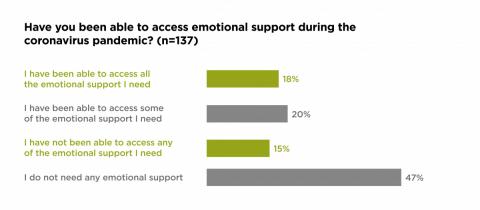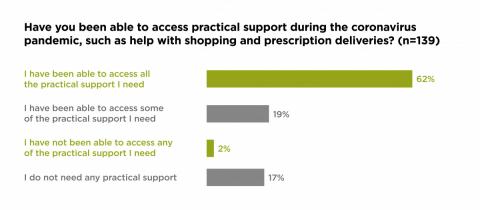Individuals recognised as extremely clinically vulnerable to COVID-19 were advised to minimise all interaction with them and others, and to facilitate this the Shielding programme was in place which included help with accessing food and medicines.
We asked stem cell transplant patients what support they have been able to access at this time, and where they received this from.
Emotional support

Of those who felt they needed emotional support, 53%, only 33% were able to access all the emotional support they needed. This was supported by some of the free text comments which suggested that psychological support previously offered had in some cases been discontinued due to COVID-19 related disruption.
Not being able to see my counsellor and my psychology referral being cancelled if affecting my mentally - it's thought I have PTSD and anxiety since transplant over a year ago. Waiting to see someone for an assessment but not heard anything since the beginning of March.
Patient survey respondent
This builds on the picture from a previous survey we conducted in April 2020, which found that patients feel that emotional support is a specific unmet need for stem cell transplant patients, and those shielding.
There doesn’t seem to be any mental health support for people in this situation.
Patient survey respondent
Meeting emotional support needs
Emotional support appears to be harder to access than practical support, which is part of a package implemented by the Government and is not seen to be part of the remit of local volunteer schemes. The impact of COVID-19 on patient experience and quality of life should be measured or monitored. An accurate understanding of patients’ short-, medium- and long-term needs, especially for emotional support, is key to ensure the patient pathway and services can capture and respond to these.
Anthony Nolan’s free service enables you to discuss any concerns you may have around transplant or recovery with a team of wellbeing specialists. We launched this service in response to patient feedback during COVID-19.
In addition to the physical challenges, the stem cell transplant process and recovery can be very challenging for your mental and emotional wellbeing.
We want to make sure that if you have any worries at all, you have someone to talk to. That’s why we’ve developed the free Telephone Emotional Support service specifically for stem cell transplant patients and family members, provided by Working to Wellbeing.
Through a series of appointments, you will be able to talk to someone about whatever’s on your mind. Working to Wellbeing are a team of wellbeing specialists including qualified psychologists with years of experience providing support for stem cell transplant patients.
If you think this service might be helpful to you, or you would like to find out more, please email our team to arrange an appointment at patientinfo@anthonynolan.org
Practical support

While 62% of respondents reported that they had been able to access all of the practical support they need, such as help with shopping and prescription deliveries, 21% of patients have only had these needs partially met, or not at all.
36% of respondents who report accessing practical support are utilising the Government support on offer. The majority of respondents were receiving support from both the government and their family and friends, although 15% of the respondents are solely relying on government or local authority support to meet their practical needs.
The support has been good from the hospital and from the local council (who put me in touch with a volunteer shopper) and from the government initially in the form of food parcels.
Patient survey respondent
I'm fortunate that my son gets me shopping and I also do my grocery shopping online. My chemist has delivered my medication and my G.P has an online ordering system.
Patient survey respondent
Meeting ongoing practical support needs
The findings suggest that the removal of government support will impact heavily on patient’s family and friends, increasing the level of support they will need to offer in order to offset the end of the shielding programme.
As a number of stem cell transplant patients are likely to remain shielding beyond 1 August based on medical advice, the removal of practical support will have significant ramifications for their ability to stay safe.
Clear, consistent and timely communication from Government can help improve patients’ emotional wellbeing and mental health, as well as assist healthcare professionals and charities to provide the best possible advice to these patients about the level of risk they face returning to ‘normal’.